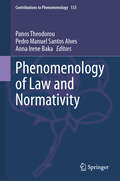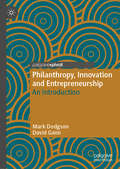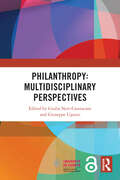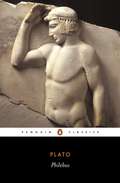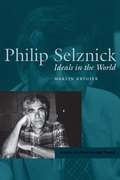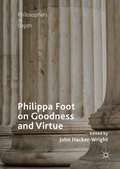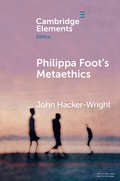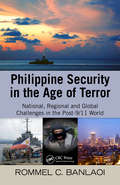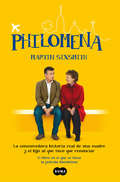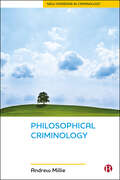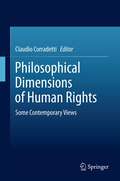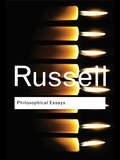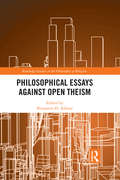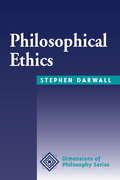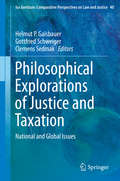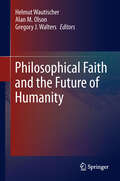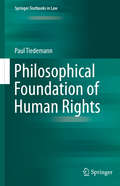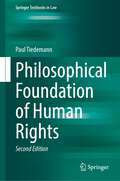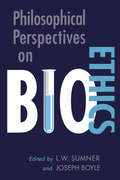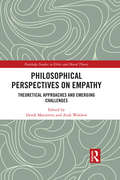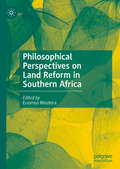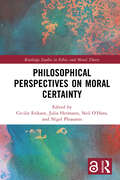- Table View
- List View
Phenomenology of Law and Normativity (Contributions to Phenomenology #133)
by Panos Theodorou Pedro Manuel Santos Alves Anna Irene BakaAgainst the widespread, mainstream take on the philosophy of law, this collected volume fills an important scholarly gap by introducing a phenomenological account of some of the major questions and themes of jurisprudence such as rights and norms. This volume argues that wherever there is a demand for grounding normativity, the phenomenological method can provide a priori—albeit corrigible—access to essential truths, with reference to beings and their social relationships. The present work reflects upon the place and potential impact on the theory of law and normativity stemming from the phenomenology of Edmund Husserl—largely overlooked by legal philosophers and legal theorists. Further coverage contains those who have built upon these ideas of Husserl such as Martin Heidegger, Alfred Schutz, Edith Stein, Emmanuel Levinas, and Adolf Reinach. This text addresses new issues and questions from the general perspective of the phenomenology of law. It is a response to those critical of phenomenology by presenting sober arguments in support of its potential for achieving a deeper grasp of legal normative concepts such as rights, claims, obligations, promises, and apologies. Boundaries between law and morality as well as legal and social ontologies are approached from a phenomenological perspective. It appeals to students, researchers, and professionals working in phenomenology, ethics, legal philosophy, and human rights theory and practice.
Philadelphia Freedom
by David Kairys"David Kairys is one of the grand long-distance runners in the struggle for justice in America. His brilliant legal mind and superb lawyerly skills are legendary. This marvelous book is his gift to us!" ---Cornel West, Professor of Religion and African American Studies, Princeton University, and award-winning author of Race Matters Philadelphia Freedom is the spellbinding tale of an idealistic young lawyer coming of age in the political cauldron of the 1960s and 1970s. From his immersion in the civil rights movement to his determined court battles to quell criminal violence by Philadelphia police, Kairys recounts how he helped make history in the city of brotherly love." ---William K. Marimow, Editor and Executive Vice President, Philadelphia Inquirer, and recipient of two Pulitzer Prizes "In the current climate of political deception and the trampling of our civil rights, Kairys's compelling book is a clenched fist, a prayer for social justice and a call to conscience." ---Steve Lopez, Los Angeles Times columnist and former Philadelphia Inquirer columnist "With engaging, insider stories of innovative legal strategies of a truly creative lawyer, this book evokes the ebullient spirit of progressive social change launched in the 1960s and should be read by aspiring and practicing lawyers as well as anyone interested in American social history. Philadelphia Freedom reads like a suspense novel and reveals how novel legal and political thinking can and does make a real difference to individuals and to the quality of justice." ---Martha L. Minow, Jeremiah Smith, Jr. Professor of Law, Harvard University "David Kairys's compelling book properly explains the vital role that civil rights attorneys play in our system of justice." ---Judge John E. Jones III, United States District Court for the Middle District of Pennsylvania, and presiding judge in the landmark Kitzmiller v. Dover Area School District case A memoir that is also a compelling page-turner, Philadelphia Freedom is the poignant, informative, often inspiring account of renowned civil-rights lawyer David Kairys's personal quest for achieving social justice during the turbulent 1960s and 70s. Philadelphia Freedom brings us intimately and directly into Kairys's burgeoning law career and the struggles of the 60s as his professional and private life navigated the turmoil and promise of the civil rights and antiwar movements. Many of the cases Kairys took on involved discrimination and equal protection, freedom of speech, and government malfeasance. Kairys is perhaps most well known for his victory in the Camden 28 draft board case, in which the FBI set up a sting of the Catholic anti-war left at the behest of the highest levels of government. The stories and cases range from nationally important and recognizable---the family of the scientist the CIA unwittingly gave LSD in the 1950s; the leading race discrimination case against the FBI; Dr. Benjamin Spock's First Amendment case before the Supreme Court; the city handgun lawsuits Kairys conceived---to those he encountered in his early work as a public defender. The characters include public figures such as FBI Directors J. Edgar Hoover and Louis Freeh; CIA Director William Colby; Pennsylvania Senator Arlen Specter; New York Attorney General Eliot Spitzer; U.S. Attorneys General Edward Levi and John Mitchell; Georgia Governor Lester Maddox; Pennsylvania Governor, former Philadelphia Mayor, and Democratic National Committee chair Ed Rendell; Philadelphia Mayor and Police Commissioner Frank Rizzo. But some of the most memorable are not well known, involving regular people caught up in the often heartless machinery of the courts and legal system. Though it reads like a novel, with all the elements of character, plot, and suspense, Philadelphia Freedom also has historical significance as a firsthand account of the 1960s and 70s and contains social commentary about race as well as insights and major perspectives on the nature and social role of law. David Kairys is Professor of Law at Beasley School of Law, Temple University. He ...
Philadelphia Freedom: Memoir of a Civil Rights Lawyer
by David Kairys"David Kairys is one of the grand long-distance runners in the struggle for justice in America. His brilliant legal mind and superb lawyerly skills are legendary. This marvelous book is his gift to us!" ---Cornel West, Professor of Religion and African American Studies, Princeton University, and award-winning author of Race Matters Philadelphia Freedom is the spellbinding tale of an idealistic young lawyer coming of age in the political cauldron of the 1960s and 1970s. From his immersion in the civil rights movement to his determined court battles to quell criminal violence by Philadelphia police, Kairys recounts how he helped make history in the city of brotherly love." ---William K. Marimow, Editor and Executive Vice President, Philadelphia Inquirer, and recipient of two Pulitzer Prizes "In the current climate of political deception and the trampling of our civil rights, Kairys's compelling book is a clenched fist, a prayer for social justice and a call to conscience." ---Steve Lopez, Los Angeles Times columnist and former Philadelphia Inquirer columnist "With engaging, insider stories of innovative legal strategies of a truly creative lawyer, this book evokes the ebullient spirit of progressive social change launched in the 1960s and should be read by aspiring and practicing lawyers as well as anyone interested in American social history. Philadelphia Freedom reads like a suspense novel and reveals how novel legal and political thinking can and does make a real difference to individuals and to the quality of justice." ---Martha L. Minow, Jeremiah Smith, Jr. Professor of Law, Harvard University "David Kairys's compelling book properly explains the vital role that civil rights attorneys play in our system of justice." ---Judge John E. Jones III, United States District Court for the Middle District of Pennsylvania, and presiding judge in the landmark Kitzmiller v. Dover Area School District case A memoir that is also a compelling page-turner, Philadelphia Freedom is the poignant, informative, often inspiring account of renowned civil-rights lawyer David Kairys's personal quest for achieving social justice during the turbulent 1960s and 70s. Philadelphia Freedom brings us intimately and directly into Kairys's burgeoning law career and the struggles of the 60s as his professional and private life navigated the turmoil and promise of the civil rights and antiwar movements. Many of the cases Kairys took on involved discrimination and equal protection, freedom of speech, and government malfeasance. Kairys is perhaps most well known for his victory in the Camden 28 draft board case, in which the FBI set up a sting of the Catholic anti-war left at the behest of the highest levels of government. The stories and cases range from nationally important and recognizable---the family of the scientist the CIA unwittingly gave LSD in the 1950s; the leading race discrimination case against the FBI; Dr. Benjamin Spock's First Amendment case before the Supreme Court; the city handgun lawsuits Kairys conceived---to those he encountered in his early work as a public defender. The characters include public figures such as FBI Directors J. Edgar Hoover and Louis Freeh; CIA Director William Colby; Pennsylvania Senator Arlen Specter; New York Attorney General Eliot Spitzer; U.S. Attorneys General Edward Levi and John Mitchell; Georgia Governor Lester Maddox; Pennsylvania Governor, former Philadelphia Mayor, and Democratic National Committee chair Ed Rendell; Philadelphia Mayor and Police Commissioner Frank Rizzo. But some of the most memorable are not well known, involving regular people caught up in the often heartless machinery of the courts and legal system. Though it reads like a novel, with all the elements of character, plot, and suspense, Philadelphia Freedom also has historical significance as a firsthand account of the 1960s and 70s and contains social commentary about race as well as insights and major perspectives on the nature and social role of law. David Kairys is Professor of Law at Beasley School of Law, Temple University. He ...
Philanthropy, Innovation and Entrepreneurship: An Introduction
by David Gann Mark DodgsonIntended as an essential introduction to philanthropy, this book provides a balanced, analytical, interdisciplinary overview of a complex, and often controversial, topic. Using case studies to illustrate the narrative, it covers everything from the history of individual, sometimes eccentric, philanthropists, to the controversies and challenges of ‘philanthrocapitalism’. This book explores philanthropists and their motivations: who are they and why do they give their money away? It explains what philanthropy does: its history and scope, and the impacts it has in areas such as science and the arts. The governance of philanthropy is explored: how decisions are reached about donations and their accountability. The book addresses the major controversies surrounding philanthropy, and discusses the difficulties involved in giving and receiving, e.g. the importance of ensuring that these processes are transparent and accountable. Lastly, the book considers the future of philanthropy, especially its changing role in society and the disruptive impact of digital technologies.Given its scope, the book offers a valuable resource for researchers interested in philanthropy, innovation and entrepreneurship, the motivations for individual and corporate donations, and the business of giving in general.
Philanthropy: Multidisciplinary Perspectives (Routledge Research Companions in Business and Economics)
by Giulia Neri-Castracane and Giuseppe UgazioPhilanthropy Multidisciplinary Perspectives is a reference for academics and professionals engaged in philanthropy. It brings together scholars from fields such as economics, finance, law, philosophy, and sociology, showcasing the power of a multidisciplinary approach in providing a comprehensive view of this complex subject.The book addresses foundational questions in philanthropy and is divided into four parts. The first part asks the crucial question of why philanthropy matters, exploring the motivations behind giving and how beneficiaries are selected. The second part looks at the interaction between business and philanthropy. It examines the rise of social enterprises, the shift toward purpose-driven businesses, and the evolution of corporate social responsibility into sustainable enterprises. This part also addresses tax considerations that impact philanthropy's ability to scale. The book explores the synergies between finance and philanthropy to foster sustainable development and how philanthropy is addressing or could address specific SDGs. It concludes with key ingredients for good governance in philanthropy.The book tackles major challenges, such as diversity, compensation, and data management, while tracing the evolution of best practices in foundation governance. It identifies areas for improvement and discusses the relationships between governance in philanthropic organizations and important issues such as trust, equality, and democracy.The Open Access version of this book, available at http://www.taylorfrancis.com, has been made available under a Creative Commons Attribution-Non Commercial-No Derivatives (CC BY-NC-ND) 4.0 license.
Philebus
by PlatoTaking the form of a discussion between the hedonist Philebus, his naïve disciple Protarchus and Socrates, Philebus is a compelling consideration of the popular belief that pleasure is the greatest attainable good. Here, Socrates speculates on the differing intensities of both pleasure and pain; explores the notion that they can be divided into pure and impure types; considers the relationship between the one and the many; and establishes knowledge as a far higher goal. A profound argument that true fulfillment can only be achieved by the pursuit of beauty, truth and moderation, Philebus is among the earliest and most fascinating explorations of one of the most fundamental human questions: how to lead a good life.
Philip Selznick: Ideals in the World
by Martin KrygierPhilip Selznick's wide-ranging writings engaged with fundamental questions concerning society, politics, institutions, law, and morals. Never confined by a single discipline or approach, he proved himself a major figure across a range of fields including sociology, organizations and institutions, leadership, political science, sociology of law, political theory, and social philosophy. This volume, the first book-length treatment of Selznick's ideas, discusses Selznick's various intellectual contributions. Reading across Selznick's work, one appreciates the coherence of his fundamental preoccupations-with the social conditions for frustration and the vindication of values and ideas. Exploring Selznick's insights into the nature and quality of institutional, legal, and social life, the book also examines his particular ways of thinking, concerns, values, and sensibility. Martin Krygier brings to light the coherence of Selznick's fundamental preoccupations, allowing readers to fully engage with his unique insights and distinctive moral-intellectual sensibility.
Philippa Foot on Goodness and Virtue (Philosophers in Depth)
by John Hacker-WrightThis volume focuses on controversial issues that stem from Philippa Foot’s later writings on natural goodness which are at the center of contemporary discussions of virtue ethics. The chapters address questions about how Foot relates judgments of moral goodness to human nature, how Foot understands happiness, and addresses objections to her framework from the perspective of empirical biology. The volume will be of value to any student or scholar with an interest in virtue ethics and analytic moral philosophy.
Philippa Foot's Metaethics (Elements in Ethics)
by John Hacker-WrightThis Element presents an interpretation and defence of Philippa Foot's ethical naturalism. It begins with the often neglected grammatical method that Foot derives from an interpretation of Ludwig Wittgenstein's later philosophy. This method shapes her approach to understanding goodness as well as the role that she attributes to human nature in ethical judgment. Moral virtues understood as perfections of human powers are central to Foot's account of ethical judgment. The thrust of the interpretation offered here is that Foot's metaethics takes ethical judgment to be tied to our self-understanding as a sort of rational animal. Foot's metaethics thereby offers a compelling contemporary approach that preserves some of the best insights of the Aristotelian tradition in practical philosophy.
Philippine Security in the Age of Terror: National, Regional, and Global Challenges in the Post-9/11 World
by Rommel BanlaoiAs the twelfth most populous nation, the Philippines diverse religious and ethnic population makes it an ideal example of the changing tenet of what is deemed national security post 9/11. Issues previously considered social or public are now viewed as security issues. Food production is now analyzed in the context of food security and environmenta
Philomena
by Martin SixsmithNew York Times Bestseller. Now a major motion picture starring Judi Dench and Steve Coogan and nominated for four Academy Awards: the heartbreaking true story of an Irishwoman and the secret she kept for 50 years. When she became pregnant as a teenager in Ireland in 1952, Philomena Lee was sent to a convent to be looked after as a "fallen woman. ” Then the nuns took her baby from her and sold him, like thousands of others, to America for adoption. Fifty years later, Philomena decided to find him. Meanwhile, on the other side of the Atlantic, Philomena’s son was trying to find her. Renamed Michael Hess, he had become a leading lawyer in the first Bush administration, and he struggled to hide secrets that would jeopardize his career in the Republican Party and endanger his quest to find his mother. A gripping exposé told with novelistic intrigue, Philomena pulls back the curtain on the role of the Catholic Church in forced adoptions and on the love between a mother and son who endured a lifelong separation.
Philosophical Criminology (New Horizons in Criminology)
by Andrew MilliePhilosophical criminology asks big questions about how we get on with one another and what happens when we do not. This accessible book in the New Horizons in Criminology series is the first to foreground this growing area. The book is structured around six philosophical ideas concerning our relations with others: values, morality, aesthetics, order, rules and respect. Building on the author’s theoretical and empirical research, the book considers the boundaries of criminology and the scope for greater exchange between criminology and philosophy. The book is illustrated using examples from a range of countries, and provides a platform for engaging with important topical issues using philosophical and theoretical insights.
Philosophical Dimensions of Human Rights
by Claudio CorradettiThis book presents a unique collection of the most relevant perspectives in contemporary human rights philosophy. Different intellectual traditions are brought together to explore some of the core postmodern issues challenging standard justifications. Widely accessible also to non experts, contributions aim at opening new perspectives on the state of the art of the philosophy of human rights. This makes this book particularly suitable to human rights experts as well as master and doctoral students. Further, while conceived in a uniform and homogeneous way, the book is internally organized around three central themes: an introduction to theories of rights and their relation to values; a set of contributions presenting some of the most influential contemporary strategies; and finally a number of articles evaluating those empirical challenges springing from the implementation of human rights. This specific set-up of the book provides readers with a stimulating presentation of a growing and interconnecting number of problems that post-natural law theories face today. While most of the contributions are new and specifically conceived for the present occasion, the volume includes also some recently published influential essays on rights, democracy and their political implementation.
Philosophical Essays
by Bertrand RussellFirst published in 1910, Philosophical Essays is one of Bertrand Russell’s earliest works and marks an important period in the evolution of thought of one of the world’s most influential thinkers. This selection of seven essays displays Russell's incisiveness and brilliance of exposition in the examination of ethical subjects and the nature of truth. Insightful and highly accessible, these essays are as illuminating today as they were on first publication.
Philosophical Essays Against Open Theism (Routledge Studies in the Philosophy of Religion)
by Benjamin H. ArbourThis new collection of philosophically rigorous essays critiques the interpretation of divine omniscience known as open theism, focusing primarily on philosophically motivated open theism and positing arguments that reject divine knowledge of future contingents in the face of the dilemma of freedom and foreknowledge. The sixteen new essays in this collection, written by some of the most renowned philosophers on the topic of divine providence, represent a philosophical attempt to seriously consider open theism. They cover a wide variety of issues, including: the ontology of time, systematic metaphysics, perfect being theology, the Christian doctrine of the Incarnation, the problem of evil, and the nature of divine knowledge in general. Philosophical Essays Against Open Theism advances the discussion by wrestling against the assertions of open theism, and will be of interest to both proponents and opponents of this controversial issue.
Philosophical Ethics
by Stephen DarwallWhy is ethics part of philosophy? Stephen Darwall's Philosophical Ethics introduces students to ethics from a distinctively philosophical perspective, one that weaves together central ethical questions such as "What has value?" and "What are our moral obligations?" with fundamental philosophical issues such as "What is value?" and "What can a moral obligation consist in?"With one eye on contemporary discussions and another on classical texts, Philosophical Ethics shows how Hobbes, Mill, Kant, Aristotle, and Nietzsche all did ethical philosophy-how, for example, they sought to gain insight into what has value through understanding what value itself is. After an introductory section, and one on main approaches to metaethics, chapters discuss "modern" philosophical moralists-Hobbes, Mill, and Kant-and pre- and postmodern philosophical approaches to ethics in Aristotle, Nietzsche, and the ethics of care.Throughout, the reader is invited to do-rather than just read about-philosophical ethics and, in doing so, to think through questions that face all thoughtful human beings. Themes include the nature of value and moral obligation, freedom and choice, human flourishing, excellence and merit, radical critiques of morality, and the importance of relationships for human life.
Philosophical Ethics
by Stephen DarwallWhy is ethics part of philosophy? Stephen Darwall’s Philosophical Ethics introduces students to ethics from a distinctively philosophical perspective, one that weaves together central ethical questions such as "What has value?” and "What are our moral obligations?” with fundamental philosophical issues such as "What is value?” and "What can a moral obligation consist in?”With one eye on contemporary discussions and another on classical texts, Philosophical Ethics shows how Hobbes, Mill, Kant, Aristotle, and Nietzsche all did ethical philosophy--how, for example, they sought to gain insight into what has value through understanding what value itself is. After an introductory section, and one on main approaches to metaethics, chapters discuss "modern” philosophical moralists--Hobbes, Mill, and Kant--and pre- and postmodern philosophical approaches to ethics in Aristotle, Nietzsche, and the ethics of care. Throughout, the reader is invited to do--rather than just read about--philosophical ethics and, in doing so, to think through questions that face all thoughtful human beings. Themes include the nature of value and moral obligation, freedom and choice, human flourishing, excellence and merit, radical critiques of morality, and the importance of relationships for human life.
Philosophical Explorations of Justice and Taxation
by Gottfried Schweiger Helmut P. Gaisbauer Clemens SedmakThis volume presents philosophical contributions examining questions of the grounding and justification of taxation and different types of taxes such as inheritance, wealth, consumption or income tax in relation to justice and the concept of a just society. The chapters cover the different levels at which the discussion on taxation and justice takes place: On the principal level, chapters investigate the justification and grounding of taxation as such and the role taxation plays and should play in the design of justice, be it for a just society or a just world order. On a more concrete level, chapters present discussions of these general reflections in more depth and examine different types of taxation, tax systems and their design and implementation. On an applied level, chapters discuss certain specific taxes, such as wealth and inheritance taxes, and examine whether or not a certain tax should be favored and for what reasons as well as why it is just to target certain kinds of assets or income. Finally, this volume contains chapters that discuss the central issue of international and global taxation and their relation to global justice.
Philosophical Faith and the Future of Humanity
by Helmut Wautischer Alan M. Olson Gregory J. WaltersKarl Jaspers, who died in 1969, had a profound impact on 20th-century theology and philosophy. His central thesis called for, among other things, a de-centering of philosophy from its Eurocentric roots and a renewal of its dialogue with other traditions, especially Asian ones. This collection of essays includes unpublished work by Jaspers himself as well as testimonies to his life and career by colleagues, associates, and translators, some of who knew Jaspers personally. Readers will also find commentary and interpretation by researchers who have explored Jaspers' work for decades, and a biographical account of Jaspers' student Leonard Ehrlich, who handled much of Jaspers' English translation. The book interrogates Jaspers' conceptions of 'philosophical faith', his philosophy of communication, and the prospects for world philosophy in the future. Focusing on philosophical faith, it assesses Jaspers' interpretations of key philosophers such as Kant, Hegel, Schelling, Kierkegaard, Nietzsche, and Rosenzweig, as well as examining his personal relationships with Bultmann and Heidegger. Contributors also look at Jaspers' philosophies of religion and history, his hypothesis of the 'axial age' (Achsenzeit), and his contributions to metaphysics, periechontology, and economics. Finally, chapters cover Jaspers' philosophy of communication and world history. The latter are informed by a burgeoning interest in Kantian 'Freiheitphilosophie' that influenced Jaspers, as well as concerns over the future of humanity. These concerns in part account for Jaspers' growing popularity in the Middle East, Eastern Europe, Central/South America, and Asia. Also included are lucid clarifications of the difference between religious and philosophical faith, and the relevance of certainty, trust, and communication for a future of mankind. Trained as a psychiatrist, Jaspers practiced this profession before becoming a philosopher and thus had a keen insight into the workings of the human mind even as he challenged the philosophical establishment of his time. It is perhaps this depth to his background that adds to the contemporary relevance of his work.
Philosophical Foundation of Human Rights (Springer Textbooks in Law)
by Paul TiedemannThis textbook presents a range of classical philosophical approaches in order to show that they are unsuitable as a foundation for human rights. Only the conception of human dignity –based on the Kantian distinction between price and dignity – can provide a sufficient basis. The derivation of human rights from the principle of human dignity allows us to identify the most crucial characteristic of human rights, namely the protection of personhood. This in turn makes it possible (1) to distinguish between real moral human rights and spurious ones, (2) to assess the scope of protection for many codified human rights according to the criteria of “core” and “yard,” and (3) offers a point of departure for creating new, unwritten human rights. This philosophical basis supports a substantial reassessment of the case law on human rights, which will ultimately allow us to improve it with regard to legal certainty, clarity and cogency.The textbook is primarily intended for advanced law students who are interested in a deeper understanding of human rights. It is also suitable for humanities students, and for anyone in the political or social arena whose work involves human rights and their enforcement.Each chapter is divided into four parts: Abstracts, Lecture, Recommended Reading, and Questions to check reader comprehension. Sample answers are included at the end of the book.
Philosophical Foundation of Human Rights (Springer Textbooks in Law)
by Paul TiedemannThis textbook presents a range of classical philosophical approaches in order to show that they are unsuitable as a foundation for human rights. Only the conception of human dignity –based on the Kantian distinction between price and dignity – can provide a sufficient basis. The derivation of human rights from the principle of human dignity allows us to identify the most crucial characteristic of human rights, namely the protection of personhood. This in turn makes it possible (1) to distinguish between real moral human rights and spurious ones, (2) to assess the scope of protection for many codified human rights according to the criteria of “core” and “yard,” and (3) offers a point of departure for creating new, unwritten human rights. This philosophical basis supports a substantial reassessment of the case law on human rights, which will ultimately allow us to improve it with regard to legal certainty, clarity and cogency.In the second edition, errors have been corrected in numerous places, the text has been made clearer and easier to understand. In addition, more recent human rights issues have been newly included, especially those related to the Corona epidemic and climate change. The textbook is primarily intended for advanced law students who are interested in a deeper understanding of human rights. It is also suitable for humanities students, and for anyone in the political or social arena whose work involves human rights and their enforcement.Each chapter is divided into four parts: Abstracts, Lecture, Recommended Reading, and Questions to check reader comprehension. Sample answers are included at the end of the book.
Philosophical Perspectives on Bioethics
by L. Wayne Sumner Joseph BoyleHow should we attempt to resolve concrete bioethical problems? How are we to understand the role of bioethics in the health care system, government, and academe? This collection of original essays raises these and other questions about the nature of bioethics as a discipline. The contributors to the volume discuss various approaches to bioethical thinking and the political and institutional contexts of bioethics, addressing underlying concerns about the purposes of its practice. Included are extended analyses of such important issues as the conduct of clinical trials, euthanasia, justice in health care, the care of children, cosmetic surgery, and reproductive technologies.
Philosophical Perspectives on Empathy: Theoretical Approaches and Emerging Challenges (Routledge Studies in Ethics and Moral Theory)
by Anik Waldow Derek MatraversEmpathy—our capacity to cognitively or affectively connect with other people’s thoughts and feelings—is a concept whose definition and meaning varies widely within philosophy and other disciplines. Philosophical Perspectives on Empathy advances research on the nature and function of empathy by exploring and challenging different theoretical approaches to this phenomenon. The first section of the book explores empathy as a historiographical method, presenting a number of rich and interesting arguments that have influenced the debate from the Nineteenth Century to the present day. The next group of essays broadly accepts the centrality of perspective-taking in empathy. Here the authors attempt to refine and improve this particular conception of empathy by clarifying the intentionality of the perspective taker’s emotion, the perspective taker’s meta-cognitive capacities, and the nature of central imagining itself. Finally, the concluding section argues for the re-evaluation, or even rejection, of empathy. These essays advance alternative theories that are relevant to current debates, such as narrative engagement and competence, attunement or the sharing of mental states, and the "second-person" model of empathy. This book features a wide range of perspectives on empathy written by experts across several different areas of philosophy. It will be of interest to researchers and upper-level students working on the philosophy of emotions across ethics, philosophy of mind, philosophy of psychology, and the history of philosophy.
Philosophical Perspectives on Land Reform in Southern Africa
by Erasmus MasiteraThis edited collection explores a variety of philosophical perspectives on land reform in Southern Africa. Presenting an innovative focus on the philosophical themes in land reform, the contributors reflect on traditional African conceptualisations of the land, as well as Western interpretations, introducing specifically Southern African approaches to a wide range of debates. Rooted in questions of colonization and decolonization, the chapters examine what reform ought to do for the people of Africa, providing contemporary reflections on the different racial and cultural facets of the land. Notably, ideas of reconciliation, compensation, justice, development, emancipation, Ubuntu, and empowerment are explored. Vigorous and interdisciplinary in their approach, the fifteen original chapters tackle a range of questions such as: What does land mean in Africa? What ethical considerations are relevant? Which mechanisms should be used in addressing injustice regarding land reform and redistribution? Providing a comprehensive engagement with philosophical and political issues of land reform in Southern Africa, this volume is an invaluable resource to scholars, not only in Africa, but wherever similar questions of land, dispossession, and justice arise.
Philosophical Perspectives on Moral Certainty (Routledge Studies in Ethics and Moral Theory)
by Neil O'Hara Julia Hermann Nigel Pleasants Cecilie EriksenMoral certainty refers to those aspects of morality- moral acting, feeling, and thinking-that are beyond doubt, explanation, and justification. The essays in this book explore the concept of moral certainty and its application and usefulness in contemporary moral debates. The notion of moral certainty, which is inspired by the philosophy of Ludwig Wittgenstein, is emerging as a key reference point in contemporary moral philosophy. An investigation of the implications of moral certainty is called for, given that so many discussions in moral philosophy concern the possibility of justifying our moral beliefs. The concept of moral certainty also feeds directly into the emerging field of hinge epistemology. The chapters in this volume tackle the following issues: meta-questions around whether and how we can make sense of the concept of moral certainty; the role of moral certainty in contemporary debates on gender, racism, bias and historically unjust practices; ways in which radical change in society engendered by new technologies might affect moral certainties; the role of the notion of moral certainty in the debates on free will and moral responsibility. Philosophical Perspectives on Moral Certainty will appeal to researchers and advanced students working on ethics and moral philosophy, epistemology, philosophy of technology, and Wittgenstein.
